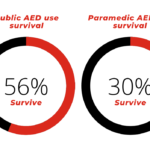West Australian farmer Nigel Norwood owes his life to the fast thinking of his family and nearby campers after he collapsed from sudden cardiac arrest during a remote beach trip.
Nigel, 47, was camping with his wife and two teenage sons at Alexander Bay – a secluded stretch of coastline more than 100km from the nearest hospital – when his heart suddenly stopped without warning.
His wife, Lynne, said there were no obvious red flags leading up to the event. “We were just about to start dinner after a day on the beach when both boys told me something was wrong with their dad,” she said.
By the time she turned to him, Nigel was slumped in his chair and completely unresponsive.
With no mobile phone coverage, Lynne rushed to contact emergency services through a neighbouring campsite’s Starlink connection. Meanwhile, 16-year-old Liam began chest compressions with help from another camper, while 19-year-old Bevan sprinted to locate a nearby St John defibrillator (AED) mounted in the public toilet block.
After three electric shocks from the defibrillator, Nigel’s pulse returned — a moment Lynne described as overwhelming relief. “We could see him become responsive and we were able to hold him,” she said.
He was later flown from Esperance Hospital to Perth’s Fiona Stanley Hospital, where he spent several weeks in recovery. Now back home and feeling “fine”, Nigel says the ordeal was a clear reminder of how quickly life can change.
“It’s like it never happened. But it’s changed my perspective – you’ve got to live in the now,” he said.
Understanding Cardiac Arrest vs Heart Attack
The Norwood family are now encouraging others to prioritise regular heart health checks — especially those in regional areas where emergency help may be delayed.
Lynne said it’s critical for people to understand the difference between a heart attack and cardiac arrest. “A heart attack is a blockage. Cardiac arrest is when the heart stops completely — and that’s when you need to act fast with CPR and a defib.”
She also urged people to take first-aid training seriously and to be aware of the locations of portable automated external defibrillators (AEDs) in public spaces.
St John WA paramedic and resuscitation specialist Jason Belcher confirmed that without immediate CPR and access to an AED, survival would have been unlikely. “For every minute without chest compressions and a defibrillator, survival drops by 10 per cent,” he said.
There are currently over 11,000 registered AEDs in Western Australia, and stories like Nigel’s show just how vital they can be.
First Aid Saves Lives And This Family Proves It
Liam credits his high school first-aid course for knowing how to respond. “Dad wouldn’t be here without that training,” he said. “It was fresh in my head and I knew what to do.”
Bevan added that it all happened so fast, but instincts kicked in. “It was like Dad had just fallen asleep. We just focused on what had to be done.”
This rural family’s experience is a powerful reminder of how early CPR and quick access to a defibrillator can mean the difference between life and death.
If you live remotely, work on a farm, or simply want peace of mind, now’s the time to learn CPR, find your nearest AED, and get your heart checked.
Source: ABC




